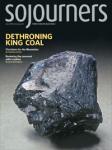The life of Johnny Cash, the man, ended in 2003, but Johnny Cash, the artist, just had his final moment in February 2010. That’s when American VI: Ain’t No Grave was released as the last in the series of austere, nakedly honest recordings Cash made with legendary rock and rap producer Rick Rubin. On the album, recorded in 2002, we hear a physically weakened artist making grief, illness, and mortality as much a part of his work as rebellion and defiance had once been.
In 2003, Johnny Cash was 71 and in bad health when his wife of 35 years, June Carter, died unexpectedly. The world at large knows about Johnny and June from the 2005 bio-pic Walk the Line. But that film only showed the beginning of their marriage. The rest was not all happily ever after. Cash was always a man in motion, and the motion wasn’t always forward. There was a pretty serious drug relapse in 1983, and even after he came back from that, the country music industry fairly much pushed him to the curb like a worn-out piece of furniture. In the mid-’90s, when Rick Rubin found him, Cash had been dropped by his record company and was playing the Ozark tourist trap of Branson, Missouri, a sort of elephant’s graveyard for country music has-beens.
The American series gave Cash a new audience and a renewed sense of his core artistic mission. Cash always saw no contradiction between honoring his roots and finding common ground with the new and different. At his career peak in the late 1960s, he was equally at home hanging out with Billy Graham or Bob Dylan. So we shouldn’t have been surprised when he made records full of gangsta-strength murder ballads and gospel songs and spiced them with covers of material from Soundgarden or Nine Inch Nails. The work with Rubin allowed Cash to define himself and his art completely on his own terms, perhaps for the first time since he left Sam Phillips’ Sun Records.
From 1968 on, June was at his side. When she was taken away, we might have expected Cash to go crazy, maybe even flame out in one last septuagenarian binge. Instead he showed the deep character that had developed from his tenant-farmer upbringing in Dyess, Arkansas, his struggles for recovery from addiction, and his lifelong (if intermittent) practice of his Christian faith. The American series was supposed to have ended with American IV: The Man Comes Around, but, almost immediately after June’s death, Cash called up Rubin and went back to work, turning his last round of earthly suffering into art.
They worked for months, recording dozens of tracks, resulting in two posthumous albums. On this last one, intimations of mortality are everywhere, from the title track, a traditional gospel number about the final resurrection that here sounds as spooky as a zombie movie soundtrack, to Cash’s wistful reading of the old folkie favorite, “(Can’t Help But Wonder) Where I’m Bound.” Even “For the Good Times,” a really hokey break-up song, takes on a new gravitas sung by the widowed Johnny over the grave of his June.
Over the course of his career, Johnny Cash showed his devoted followers how to raise hell (on, for instance, Folsom Prison Blues), how to take a stand for an unpopular cause (go back and listen to “Man in Black,” released to country radio in 1971), and how to confront personal demons (as in his recording of Kris Kristofferson’s “Sunday Morning Coming Down”). On Ain’t No Grave, the man in black shows us how to die.
Danny Duncan Collum, a Sojourners contributing writer, teaches writing at Kentucky State University in Frankfort, Kentucky.

Got something to say about what you're reading? We value your feedback!